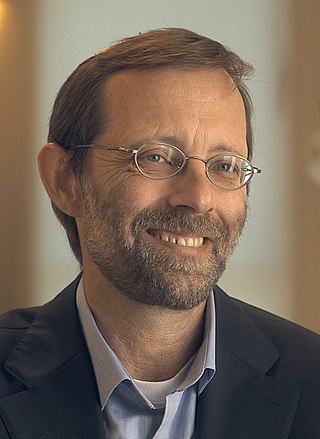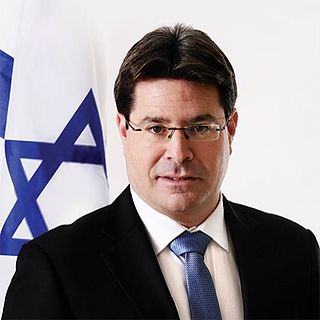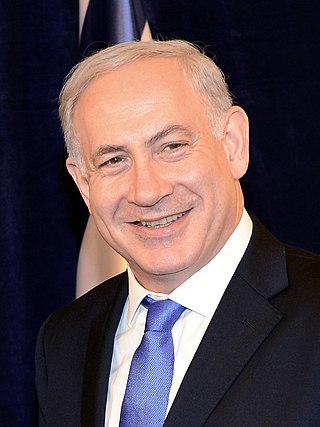| | ||||||||||||||||
| ||||||||||||||||
| ||||||||||||||||
| ||||||||||||||||
| Part of a series on the |
 |
|---|
A leadership election was held by the Likud party on 31 December 2014. [1] It was won by incumbent Prime Minister and leader of Likud Benjamin Netanyahu.
| | ||||||||||||||||
| ||||||||||||||||
| ||||||||||||||||
| ||||||||||||||||
| Part of a series on the |
 |
|---|
A leadership election was held by the Likud party on 31 December 2014. [1] It was won by incumbent Prime Minister and leader of Likud Benjamin Netanyahu.
Incumbent Benjamin Netanyahu was expected from the beginning to run for re-election. Leading an extremely fragile coalition, the Prime Minister wanted to shore up his internal support by holding an extremely early primary, years before the mandated date of a possible election. However, the government collapsed in December 2014, [2] and an early election was mandated for 17 March 2015, [3] over two years earlier than necessary. [4]
An early poll showed that the prime minister would lose to Gideon Sa'ar in the primary; [5] so, Netanyahu asked the Likud Central Committee to move up the 6 January date to 31 December, to make sure that Sa'ar didn't have the time to mount a campaign. [6] Sa'ar objected to the proposal. [7]
The motion was put to the 3,000 member central committee, who voted in a mini-referendum via secret ballot at ten polling stations throughout the country on 10 December 2014. [8] While Likud did not release numbers, a spokesperson said 2,300 out of 3,700 eligible party members had cast ballots on the measure, which some saw as a litmus test of the prime minister's popularity within the party. [9] After approval by Likud members, [10] Likud's internal court moved the date of the election to 6 January 2015 because the vote lacked a two-thirds majority. Netanyahu appealed the decision. [11] A panel of judges accepted the appeal on 17 December 2014, and allowed the primaries to occur on 31 December 2014. [1]
The candidates were:
Gideon Sa'ar was a prospective candidate, [14] but he announced on 11 December 2014 that he would not stand for the party's leadership. [15] MK Moshe Feiglin withdrew his candidacy [10] on 18 December 2014, after the Likud court ruled that the primaries for prime minister and the Likud electoral list would occur simultaneously. [16]
Shai Galili, the comptroller of the party, called for an investigative hearing which would focus on Netanyahu's supposed use of "party resources" to further his candidacy during the Likud primary; the hearing resulted in Netanyahu's disqualification as a candidate for both chairman and a place on the election list. [17] Netanyahu was allowed to run. [18]
Early polls showed that the prime minister would lose to Gideon Sa'ar in the primary. [5]
| Candidate | Votes | Percentage |
|---|---|---|
| Benjamin Netanyahu | 33,079 | 72.87% |
| Danny Danon | 9,687 | 21.34% |
| Abstained | 2,264 | 4.98% |
| Total votes | 45,390 | 100% |
In the primary vote for spots on the Likud's electoral list for the Knesset elections, incumbent MKs Moshe Feiglin and Tzipi Hotovely, both on the right-wing of the party, failed to win spots high enough on the list to realistically have a chance of being elected to the Knesset, while Internal Affairs minister Gilad Erdan won the second spot on the list, behind Nethanyahu, and Miri Regev rose to the 4th slot, up from 12th. Feiglin, who had held the 13th spot in the outgoing Knesset, fell to the unrealistic 36th position, [21] and Hotovely fell from the 18th position [22] to the 26th slot. [21] Likud had 18 seats in the 19th Knesset, and internally expected to win a maximum of 24 seats in the next election. [21]
The top of the Likud's Knesset list was elected as follows: [23]

Likud, officially known as Likud – National Liberal Movement, is a major right-wing political party in Israel. It was founded in 1973 by Menachem Begin and Ariel Sharon in an alliance with several right-wing parties. Likud's landslide victory in the 1977 elections was a major turning point in the country's political history, marking the first time the left had lost power. In addition, it was the first time in Israel that a right-wing party won the plurality of the votes. After ruling the country for most of the 1980s, the party lost the Knesset election in 1992. Likud's candidate Benjamin Netanyahu won the vote for Prime Minister in 1996 and was given the task of forming a government after the 1996 elections. Netanyahu's government fell apart after a vote of no confidence, which led to elections being called in 1999 and Likud losing power to the One Israel coalition led by Ehud Barak.

Gideon Moshe Sa'ar is an Israeli politician who served as Minister of Justice between 2021 and 2022. Sa'ar was previously a member of the Knesset for the Likud between 2003 and 2014, Deputy Prime Minister for a brief spell in 2021, as well as holding the posts of Education Minister (2009–2013) and Minister of the Interior (2013–2014). In 2019 Sa'ar returned to the Knesset and unsuccessfully ran against longtime leader Benjamin Netanyahu for the leadership of the Likud; he left the Knesset the following year after establishing a new party called New Hope.

Moshe Zalman Feiglin is a far-right Israeli politician and activist, and the leader of libertarian Zionist party Zehut. A member of Likud, he headed the Manhigut Yehudit faction within the party, and represented Likud in the Knesset between 2013 and 2015.

Manhigut Yehudit is a movement started by Moshe Feiglin and Shmuel Sackett to lead the State of Israel with, in their words, "authentic Jewish values". This has been widely interpreted, both by Manhigut supporters and outside observers, as Orthodox Judaism, but without a 'Galut' mentality. The movement opposes religious and secular coercion, and wants Jewish identity, as prescribed by the 'Tanakh' or Hebrew Bible, and authentic Jewish teachings to become Israel's official culture.

Ze'ev Binyamin "Benny" Begin, is an Israeli geologist and politician. He was a member of the Knesset for New Hope, having previously served as a member for Likud and Herut – The National Movement. He is the son of former Prime Minister of Israel Menachem Begin.

Danny Danon is an Israeli politician and former diplomat. A member of the Likud party, Danon served in the Knesset from 2009 to 2015, and re-entered the Knesset in 2022. From 2015 to 2020, Danon served as Israel's 17th Permanent Representative to the United Nations. The former leader of the world Betar organization, Danon was elected Chairman of the World Likud. Considered a 'right-wing thorn in Netanyahu's side," Danon challenged Benjamin Netanyahu for the party's leadership in 2007 and 2014.

Elections for the 18th Knesset were held in Israel on 10 February 2009. These elections became necessary due to the resignation of Prime Minister Ehud Olmert as leader of the Kadima party, and the failure of his successor, Tzipi Livni, to form a coalition government. Had Olmert remained in office or had Livni formed a coalition government, the elections would have been scheduled for 2010 instead.

Ofir Akunis is an Israeli politician. He currently serves as a member of the Knesset for Likud and is the Minister of Science and Technology. He has previously held the posts of Minister of Labor, Social Affairs and Social Services in 2020, Minister of Science and Technology in 2015-2020 and Minister of Regional Cooperation in 2020-2021.

An election for the leadership of Likud was held on 31 January 2012.
An election for the leadership of Kadima was held on 27 March 2012, pitting Tzipi Livni against Shaul Mofaz. Mofaz won with 62% of the vote.

Early elections for the twentieth Knesset were held in Israel on 17 March 2015. Disagreements within the governing coalition, particularly over the budget and a "Jewish state" proposal, led to the dissolution of the government in December 2014. The Labor Party and Hatnuah formed a coalition, called Zionist Union, with the hope of defeating the Likud party, which had led the previous governing coalition along with Yisrael Beiteinu, Yesh Atid, The Jewish Home, and Hatnuah.
Early legislative elections were held in Israel on 9 April 2019 to elect the 120 members of the 21st Knesset. Elections had been due in November 2019, but were brought forward following a dispute between members of the current government over a bill on national service for the ultra-Orthodox population, as well as impending corruption charges against incumbent Prime Minister Benjamin Netanyahu.

Zehut was a right-libertarian and nationalist political party in Israel founded in 2015 by Moshe Feiglin. Its platform was centered around promoting individual liberty, including economic freedom, and annexing the West Bank. The party also advocated for legalization of cannabis.
Snap legislative elections were held in Israel on 17 September 2019 to elect the 120 members of the 22nd Knesset. Following the previous elections in April, incumbent Prime Minister Benjamin Netanyahu failed to form a governing coalition for a second consecutive time. On 30 May, the Knesset voted to dissolve itself and trigger new elections, in order to prevent Blue and White party leader Benny Gantz from being appointed Prime Minister-designate. This election marked the first time the Knesset voted to dissolve itself before a government had been formed.
Legislative elections were held in Israel on 2 March 2020 to elect members of the twenty-third Knesset. The result was initially a stalemate, which was resolved when Likud and Blue & White reached a coalition agreement. Under the terms of the agreement, the premiership would rotate between Benjamin Netanyahu and Benny Gantz, with Gantz given the new position of Alternate Prime Minister until November 2021. These elections followed the continued political deadlock after the April and September 2019 Knesset elections.
The September 2019 Israeli legislative election was held using closed list proportional representation. Each party presented a list of candidates to the Central Elections Committee prior to the election.

A leadership election was held by the Likud party on 15 August 2007. Incumbent Benjamin Netanyahu defeated challengers Moshe Feiglin and Danny Danon by a large majority.
A leadership election was held by the Likud party on 19 December 2005. former Prime Minister and Party Leader Benjamin Netanyahu defeated Deputy Prime Minister and Minister of Foreign Affairs Silvan Shalom, as well as candidates Moshe Feiglin and Israel Katz.